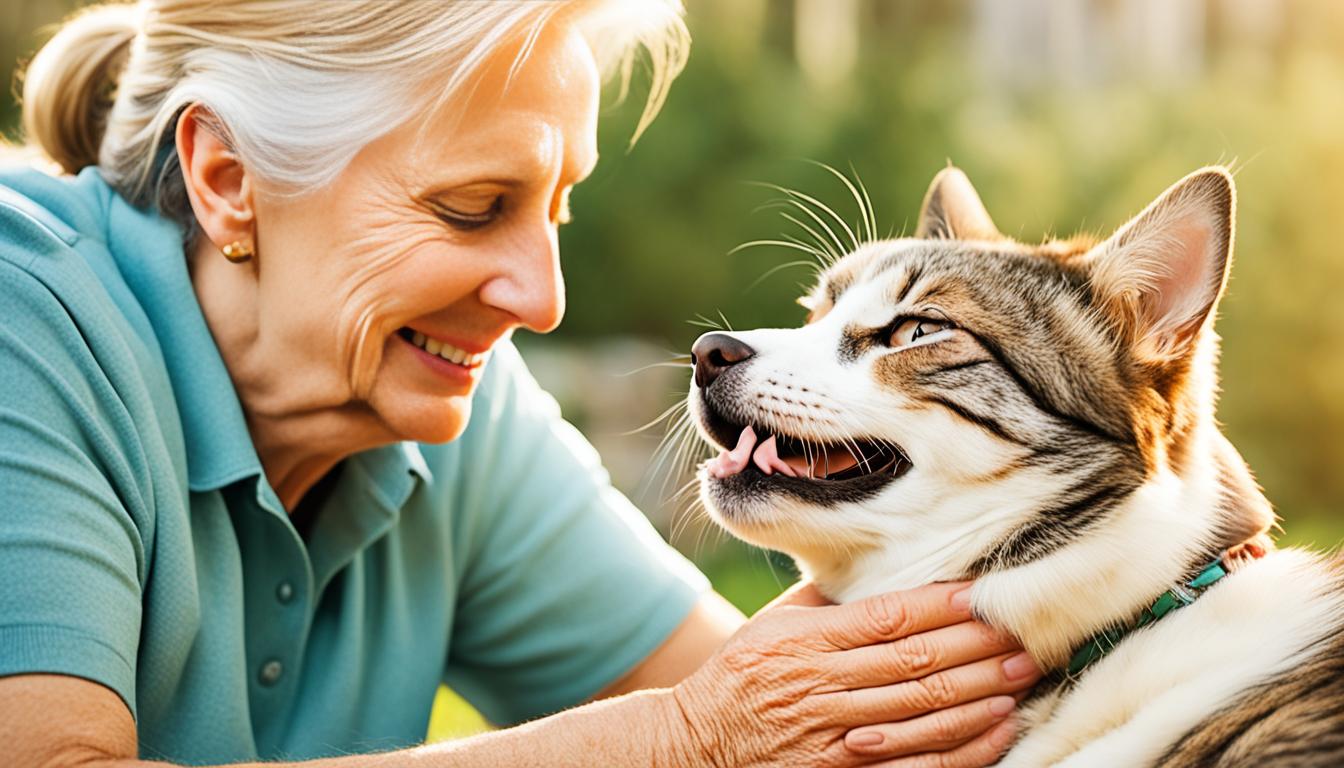In the realm of human-animal relationships, the emotional bonds we form with our pets have long been a subject of fascination and scientific inquiry. Numerous studies have delved into the intricate dynamics of pet attachment and its implications for our mental health and well-being. As a professional copywriting journalist, I’m excited to explore this captivating field and uncover the science behind the emotional connections we share with our furry, feathered, or scaly companions.
Interestingly, the relationship between emotional attachment to pets and mental health is not as straightforward as one might assume. While some research has found a positive link between strong emotional bonds with pets and improved mental health, the majority of studies have actually uncovered a negative relationship. This begs the question: what factors might be at play in this seemingly paradoxical dynamic?
One intriguing finding is that attachment to pets differs in significant ways from attachment to human relationships. Studies have shown that individuals with an insecure attachment style – those who have difficulty forming secure bonds with other people – tend to develop particularly strong emotional attachments to their companion animals. This raises the possibility that for some individuals, pets may serve as a compensatory attachment strategy, filling a void left by challenging childhood bonding experiences.
Furthermore, the current study aimed to delve deeper into the role of human attachment style in the relationship between emotional attachment to pets and mental health. The findings suggest that the positive link between pet attachment and mental health burden is fully accounted for by its shared variance with insecure attachment to humans, particularly in a sample predominantly comprising self-identified women.
These intriguing findings underscore the need for continued research to better understand the complex interplay between our emotional bonds with pets, our own attachment histories, and the implications for our mental well-being. As we continue to explore the science of pet attachment, we may uncover valuable insights that can inform how we nurture and strengthen the human-animal bond, ultimately promoting the health and happiness of both our pets and ourselves.
Key Takeaways
- Emotional attachment to pets can have both positive and negative implications for mental health, with the majority of studies finding a negative relationship.
- Attachment to pets differs from attachment to humans, with individuals with insecure attachment styles forming particularly strong emotional bonds with their companion animals.
- The positive link between emotional attachment to pets and mental health burden is fully accounted for by its shared variance with insecure attachment to humans.
- Exploring the role of attachment history and styles in the human-animal bond can provide valuable insights into the complex dynamics of pet attachment and its impact on mental well-being.
- Continued research in this field can inform how we nurture and strengthen the emotional connections we share with our pets, promoting the overall health and happiness of both human and animal.
Introduction to the Emotional Bonds with Pets
Research has shown that pet ownership has been linked to better mental health and enhanced well-being in the general population, as well as in patients with physical and mental disorders. For instance, pet ownership has been associated with lower levels of loneliness and depression and better perceived general health in older populations. However, some studies also find null or even negative effects of pet ownership on physical and mental health, raising the question of whether pet ownership is robustly associated with better health.
The Importance of Understanding Pet Emotions
To account for these diverging findings, it has been proposed that emotional attachment to pets moderates the relationship between pet ownership and mental health, with (mental) health-benefitting effects of pet ownership only present in those pet owners who show a strong emotional attachment to their pets. Research suggests that humans are often strongly attached to their pets and sometimes report even stronger attachment to pets than to human family members.
Historical Overview of Pet Ownership
The human-animal bond has been an important part of human civilization for centuries, with evidence of domesticated pets dating back thousands of years. As our understanding of animal emotions, pet psychology, and animal behavior has evolved, so too has our appreciation for the profound impact that our furry, feathered, or scaly companions can have on our mental health and well-being.
The Science of Pet Emotions
Recent research has increasingly focused on the complex relationship between emotional attachment to pets and mental health. While some studies have found a positive link between strong emotional bonds with companion animals and mental wellbeing, others have reported no association, and the majority have even uncovered a negative relationship between intense pet attachment and mental health burden. This paradoxical finding challenges the notion that only those pet owners who are deeply attached to their furry friends experience the (mental) health-benefitting effects of pet ownership.
Emotional Intelligence in Pets
An emerging line of research suggests that the relationship between emotional attachment to pets and human interpersonal bonding experiences may provide valuable insights. One study, for instance, found that a stronger emotional attachment to pets was associated with (mostly interpersonal) childhood trauma and elevated levels of dissociation. Additionally, assessments of human social support and pet attachment reveal that individuals highly attached to their companion animals tend to report lower levels of support from other human relationships.
Decoding Pet Body Language
Understanding the nuances of pet emotional expression and behavior is crucial for strengthening the human-animal bond and providing optimal care for our companion animals. Studies have found that experienced and inexperienced people differ in their ability to accurately describe dog behavior, and that owner perception of pet stress and anxiety is not always accurate. Recognizing the physical cues that indicate a pet’s emotional state is an important skill for all animal caretakers.
Evolutionary Basis of Pet Emotions
Research has explored the cognitive and social skills of domestic dogs, examining their ability to understand human social cues and gestures, as well as their emotional intelligence and capacity for attachment. Studies have found that dogs, but not chimpanzees, understand imperative pointing, and that wolves outperform dogs in following human social cues. This suggests that dogs have been selected for their ability to read and respond to human communication during the domestication process, highlighting the evolutionary basis of the strong emotional bonds that can form between pets and their owners.

Attachment Theory and Pet Relationships
Attachment theory, first proposed by John Bowlby, provides a framework for understanding how infants form emotional bonds with their primary caregivers. This seminal theory has also been applied to explore the emotional attachments that humans form with their companion animals.
Secure and Insecure Attachment Styles in Pets
Building on Bowlby’s work, Ainsworth and colleagues identified four distinct attachment styles in children: secure, anxious, avoidant, and disorganized. The latter three represent insecure attachment patterns. Secure attachment typically develops when a caregiver is attentive and responsive to a child’s distress, while insecure attachment styles can arise from inconsistent, rejecting, or abusive caregiver behavior. Researchers have begun to investigate whether similar attachment styles can be observed in the relationships between humans and their pets.
The Role of Early Bonding Experiences
Bowlby theorized that the attachment a child forms with their primary caregiver in early life shapes their “internal working models” for close relationships throughout the lifespan. In the context of pet relationships, some studies suggest that individuals with insecure attachment styles to human caregivers may form particularly strong emotional bonds with their companion animals, potentially as a compensatory strategy to buffer the effects of difficult childhood bonding experiences.
| Attachment Style | Description | Potential Implications for Pet Relationships |
|---|---|---|
| Secure | Caregiver is attentive and responsive to child’s distress | May form strong, healthy attachments to both human and animal companions |
| Anxious | Caregiver is inconsistent or slow to respond to child’s needs | May seek intense emotional bonds with pets to compensate for insecure human relationships |
| Avoidant | Caregiver consistently rejects or ignores child’s distress | May form detached or distant relationships with both human and animal companions |
| Disorganized | Caregiver’s behavior is unpredictable, often abusive or neglectful | May use pets as a source of comfort and stability, but relationships may be complex and challenging |
By understanding the potential parallels between human attachment styles and the emotional bonds that individuals form with their pets, researchers can gain valuable insights into the complex interplay between our own relational experiences and the ways in which we connect with our animal companions.
The Human-Animal Bond
The relationship between humans and their pets has long been a subject of fascination for researchers studying the science of pet emotions and the profound impact of the human-animal bond. Attachment theory, which has traditionally been used to understand interpersonal relationships, provides valuable insights into the emotional connections that develop between pet owners and their companion animals.
Benefits of Strong Emotional Bonds with Pets
Research has shown that people with insecure attachment styles, such as fearful or avoidant, often form particularly strong emotional bonds with their pets. This suggests that for some individuals, the close relationship with a pet may serve as a compensatory attachment strategy, helping to mitigate the challenges associated with forming secure human relationships, especially those that may have roots in childhood experiences. Studies have found that children with insecure attachment styles can benefit more from the presence of a therapy dog than from a friendly human in situations of social stress, underscoring the unique role that pets can play in providing comfort and support.
Challenges of Intense Pet Attachment
While the emotional bonds between pets and owners can be profoundly beneficial, research has also highlighted the potential challenges associated with intense pet attachment. Studies have found that a strong emotional attachment to pets can sometimes be linked to poorer mental health outcomes, potentially due to the compensatory nature of these relationships and the risk of pet-owner co-dependency. Understanding the nuances of this dynamic is crucial for promoting healthy, balanced relationships between humans and their animal companions.

As the field of animal behavior studies continues to evolve, researchers are gaining deeper insights into the cognitive and emotional capacities of pets, as well as the complex interplay between animal emotions and human mental health. By exploring the multifaceted nature of the human-animal bond, we can better understand how to nurture these relationships in ways that support the wellbeing of both pets and their owners.
Pet Psychology and Mental Health
Research has consistently shown that insecure attachment to humans is associated with poor mental health. The relationship between insecure attachment to humans and poor mental health has been very consistently demonstrated in the literature. However, the relationship between emotional attachment to pets and mental health is more complex, with some studies finding a positive relationship, others finding no association, and the majority finding a negative relationship between emotional attachment to pets and mental health.
This raises the question of what may account for this seemingly paradoxical link. One potential explanation is that strong emotional bonds with pets may evolve as a compensatory attachment strategy for people who were not able to establish secure relationships with other humans, particularly during childhood.
| Attachment Style | Relationship to Mental Health | Potential Role of Pets |
|---|---|---|
| Secure Attachment | Associated with better mental health | Pets may provide supplementary emotional support |
| Insecure Attachment | Associated with poorer mental health | Pets may serve as a compensatory attachment strategy |
| Disorganized Attachment | Associated with the most severe mental health issues | Pets may provide a sense of safety and stability |
Understanding the complex relationship between pet attachment, human attachment styles, and mental health is an important area of research in pet psychology. By exploring these dynamics, we can gain deeper insights into the emotional lives of our companion animals and the profound impact they have on our own well-being.
Animal Emotions and Cognitive Skills
The field of animal emotions and cognitive skills has been a topic of growing interest among researchers in the realms of pet psychology and animal behavior. Numerous studies have explored the emotional intelligence and attachment capabilities of our beloved companion animals, shedding light on their remarkable abilities to understand and communicate with their human counterparts.
Understanding Pet Behavior
One fascinating aspect of this research has been the examination of domestic dogs’ capacity to decipher human social cues and gestures. Interestingly, studies have found that dogs, but not chimpanzees, demonstrate a keen understanding of imperative pointing, suggesting that dogs have been selectively bred during the domestication process to excel at reading and responding to human communication. Furthermore, the quality of the relationship between a handler and a military dog has been shown to significantly influence the dog’s efficiency and welfare, underscoring the pivotal role of the human-animal bond in shaping pet behavior and cognition.
Perception of Pet Intelligence
Expanding on the theme of animal emotions and cognitive abilities, research has also revealed that wolves outperform domestic dogs in following human social cues. This intriguing finding highlights the nuanced and complex nature of pet intelligence, as well as the profound impact of the domestication process on the cognitive skills and emotional capacities of our canine companions. As we continue to delve deeper into the science of pet emotions, our understanding of the emotional bonds between humans and their pets will undoubtedly grow, further strengthening the human-animal bond and enhancing our ability to provide the best possible care and enrichment for our furry friends.

Reading Pet Emotional Cues
Research has provided valuable insights into how humans perceive and interpret the emotional states and behaviors of their beloved pets. Studies have revealed that experienced and inexperienced pet owners often differ in their ability to accurately describe the nuanced body language and facial expressions of our furry companions. Furthermore, research has shown that an owner’s perception of their pet’s stress and anxiety levels may not always align with the animal’s actual emotional state.
Interpreting Pet Stress and Anxiety
Understanding the subtle cues that indicate a pet’s emotional well-being is crucial for strengthening the human-animal bond and providing optimal care. Signs of stress and anxiety in pets may include panting, trembling, avoidance behaviors, and a tucked tail. By learning to recognize these emotional indicators, pet owners can better address the needs of their animal emotions and ensure their pet mental health is being prioritized.
Recognizing Joy and Affection in Pets
On the flip side, research has also explored the ways in which pets express positive emotions, such as joy and affection. Behaviors like wagging tails, playful interactions, and seeking physical contact with their owners can be interpreted as signs of a strong emotional bond between pets and owners. Recognizing these pet communication cues can deepen our understanding of animal behavior and foster a more rewarding human-animal bond.
By developing a deeper understanding of pet emotional cues and body language, pet owners can enhance their ability to provide exceptional care, address any pet stress and anxiety concerns, and cultivate a mutually fulfilling relationship with their beloved companions.
The Role of Owner Personality and Behavior
Emerging research has explored the profound influence that an owner’s personality and behavior can have on the dynamic between humans and their beloved pets. Studies have revealed that an owner’s attachment style, as well as the consistency of their training and interaction methods, play a crucial role in shaping the emotional bond and overall performance of the owner-pet dyad.
Impact of Owner Attachment Style
Intriguingly, owners with insecure attachment styles tend to form remarkably strong emotional attachments to their pets. This phenomenon may serve as a compensatory strategy, allowing these individuals to fulfill their unmet needs for secure relationships through the unconditional love and companionship of their furry friends. By better understanding the link between owner attachment styles and pet-owner dynamics, we can gain valuable insights into the complex interplay between human-animal bonds, emotional intelligence in pets, and pet mental health.
Consistency in Training and Interaction
Alongside attachment styles, the consistency with which owners approach training and daily interactions with their pets has a profound impact on the health and stability of the human-animal bond. Consistent, positive, and reinforcing interactions foster a strong, mutually beneficial relationship, allowing both the owner and pet to thrive. Conversely, inconsistent or negative training methods can lead to pet stress and anxiety, compromising the emotional well-being of the animal and the overall quality of the partnership.

By recognizing the crucial role that an owner’s personality and behavior play in shaping the pet-owner dynamic, we can strive to cultivate healthier, more fulfilling relationships between humans and their animal companions. Through a deeper understanding of pet psychology and the science of pet emotions, we can unlock the true potential of the human-animal bond and foster a world where pets and their owners thrive together.
The Science of Pet Emotions
Recent research has continued to explore the complex relationships between emotional attachment to pets, human attachment styles, and mental health. While some studies have found a positive link between strong emotional bonds with pets and mental health, the majority of research has uncovered a negative relationship, suggesting that intense pet attachment may be associated with poorer mental wellbeing. This paradox has led researchers to investigate the role of insecure human attachment as a potential mediator, with findings indicating that the positive link between pet attachment and mental health burden is fully accounted for by its shared variance with insecure attachment to humans.
Recent Research and Findings
The science of pet emotions has continued to evolve, with researchers delving deeper into the nuanced relationships between human-animal bonds and mental health outcomes. Intriguing studies have revealed that the positive association between pet attachment and mental health may be primarily driven by individuals with insecure attachment styles, who may form particularly strong emotional connections with their companion animals as a compensatory strategy. This suggests that the mental health benefits of pet ownership may be more complex than previously assumed, with the quality of human relationships playing a significant role in shaping the impact of pet attachment.
Ethical Considerations in Animal Studies
As the field of pet emotion research advances, scientists have placed a greater emphasis on ensuring the ethical treatment and welfare of animal research subjects. Researchers are now more focused than ever on minimizing distress and safeguarding the wellbeing of the pets involved in their studies. This ethical approach not only upholds the highest standards of scientific integrity but also reflects a growing recognition of the sentience and emotional capacities of our animal companions. By prioritizing the comfort and care of research animals, scientists can continue to build a deeper understanding of pet emotions and cognition while maintaining the trust and respect of the public.

Conclusion
In conclusion, the science of pet attachment and emotional bonds is a complex and fascinating field of study. Researchers have found that the relationship between emotional attachment to pets and mental health is nuanced, with strong emotional bonds potentially serving as a compensatory strategy for individuals with insecure attachment to other humans. Understanding the cognitive and social capabilities of pets, as well as the role of owner personality and behavior, is crucial for strengthening the human-animal bond and promoting the wellbeing of our companion animals.
As research in this field continues to evolve, we can expect to gain deeper insights into the emotional lives of pets and the profound impact they have on our own mental health and overall quality of life. The science of pet emotions, animal behavior, and emotional intelligence in pets offers valuable insights into the intricate connections between humans and their animal companions, providing a more comprehensive understanding of the human-animal bond.
Ultimately, the study of pet attachment and emotional bonds underscores the vital role that our furry, feathered, or scaled friends play in our lives, serving as sources of comfort, companionship, and emotional support. By embracing this growing body of research, we can cultivate more meaningful and mutually beneficial relationships with our beloved pets, fostering a deeper appreciation for the emotional capacities and cognitive abilities of the animals that enrich our lives.
FAQ
What is the relationship between emotional attachment to pets and mental health?
How do human attachment styles influence the relationship with pets?
What are the cognitive and social capabilities of pets, particularly dogs?
How do humans perceive and interpret the emotional states and behavior of their pets?
How does the owner’s personality and behavior impact the relationship and interaction with their pets?
What are the key findings from recent research on the science of pet emotions?
Source Links
- https://bmcpsychiatry.biomedcentral.com/articles/10.1186/s12888-022-04199-1
- https://www.washingtonpost.com/wellness/2024/02/11/dogs-cats-pets-attachment-love/
- https://www.ncbi.nlm.nih.gov/pmc/articles/PMC4348122/

